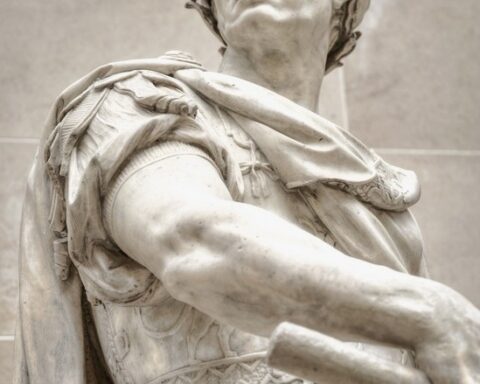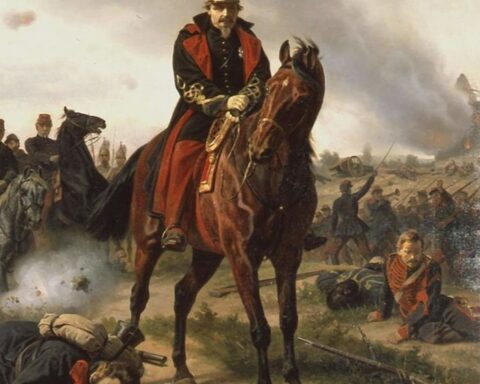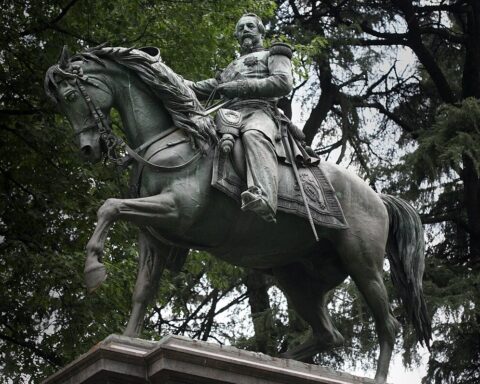Taking a stand against popular opinion is always a hard thing.
Taking a stand against your monarch’s public opinion is writing your own death certificate and hand delivering it to the carnifex while staying long enough to sharpen the axe yourself.
In 1533, More refused to attend the coronation of Anne Boleyn as the Queen of England. That was the beginning of the end for him. So let’s take a step back to see why King Henry VIII would care.
More was born February 7th, 1478. His father was a successful lawyer. Thomas was raised around high court officials and society, received a classical education at Oxford University, and was called to the Bar in 1502. Throughout his rise in rank, both socially and politically, he was known for being “an honest and effective public servant”[1]
More was knighted and made under-treasurer of the Exchequer in 1521.[1]
He had the King’s ear as his trusted secretary and adviser as he served different positions in the government.
More was a devout Catholic and saw Protestant Reformation as heresy. When he became Lord Chancellor in 1529, he continued his work in purging Protestantism books and teachers. Although he was accused of ill-treatment of Protestant heretics, he denied any claims of torture, admitting to two cases of physical punishment. He had a child caned for heresy and a “feeble-minded” man who kept disrupting prayers he had whipped. Other than that, he was fair and just as he solidified his position and place in the Court and secular government.
And then the bottom fell out of his world.
The King and the Pope had been butting heads over the annulment of Henry’s marriage to Catherine of Aragon. More supported the Pope in this matter and the King moved against More by clearing out clergy that supported the Vatican’s position. Further, Parliament “reinstatement of the charge of praemunire in 1529 had made it a crime to support in public or office the claim of any authority outside the realm (such as the Papacy) to have a legal jurisdiction superior to the King’s”[1] positioning the King to act as he saw fit and declare it to be legal.
King Henry then issued a royal decree that forced the clergy to take an oath to acknowledge that he, Henry the VIII, was the Church’s “Supreme Head” in England.
The King had positioned himself to hold the secular and religious reigns of England without contest from internal or external influences.
More didn’t have the take the oath since he wasn’t clergy but he could clearly see he wouldn’t be able to support his Liege in open contest with the Vatican. He petitioned the King to be relieved of his office as Lord Chancellor in 1532 because of his failing health. The King released him from office.
No doubt, More thought he had untangled himself sufficiently from the Court’s intrigues as to no longer be in King Henry’s sights. And he might have lived out his life removed from trouble, but he refused to attend Anne Boleyn’s coronation. He had already written a letter to King Henry to wish him and his new Queen happiness and health. But the King took his absence from the Queen’s coronation as an act of treason.
I’m only speculating here, but it seems the King was hurt by his long-time trusted adviser and friend not supporting the King’s actions to ensure a smooth transition from the King to an heir. Once the monarch’s sense of pride had been injured, he moved against his erstwhile friend.
More avoided two false charges against him. The first was for accepting bribes. It had to be dropped for the lack of evidence. The second was an accusation that he had been conspiring with the King’s critics, specifically Elizabeth Barton, a nun that had been given the sobriquet the “Holy Maid of Kent” and who had publicly defied the King by issuing a prophecy against the king’s annulment. More, a careful man, was able to produce evidence to prove otherwise, that he had written to the nun to ask her not get involved in secular matters.
More’s enemies did not stop. Parliament had passed the “Act of Succession” which, in short, made any subject, if commanded by the King or Parliament, to swear an oath that confirmed Princess Elizabeth, daughter of King Henry VIII by Anne Boleyn, as the true and legal successor to the English Crown, and denied any rights to the Crown by Princess Mary, daughter of the King by Catherine of Aragon. [2]
Combined with the Treasons Act 1534, if you were called to swear and refused, you would be charged with treason.
More agreed with Parliament that the could declare Anne as the rightful Queen of England, but he would not accept the King as having more Church authority than the Pope, not even on English soil.
It was enough to charge him with treason. April, 1534, the King had him imprisoned in the Tower of London.
More was 56 years old at this time. He should have been looking toward a quiet retirement after serving the English Crown faithfully and dutifully for all his adult life. Instead, he found himself in a harsh prison all because he valued the convictions of his conscience, informed by his faith, over political expediency and saving his own hide.
While in prison, More was visited several times by chief minister Thomas Cromwell, who begged Sir More to take the oath. Every time, More declined.
While in the Tower, More penned his devotional “A Dialogue of Comfort against Tribulation” a book on spiritual reflection and a treatment of political thought.
More was tried on July 1st, 1535, before a loaded panel of judges, three of whom were Anne Boleyn’s father, brother, and uncle. He was tried under the Treason Act for high treason.
More kept his mouth shut, refusing to answer a single question on the subject. “Qui tacet consentire videtur” (literally, who (is) silent is seen to consent) [1] was the legal aspect he used as a shield against the arms of his enemies. As long as he did not deny that the King was Supreme Head of the Church, he could not be found guilty of treason.
The last barb thrown at him he was not able to dodge. Richard Rich, the Solicitor General, was called by Thomas Cromwell, to testify against More. Rich stated that More, in front oh his presence, had denied the King’s claim to be the legitimate head of the Church.
More responded to this unsupported claim: “Can it therefore seem likely to your Lordships, that I should in so weighty an Affair as this, act so unadvisedly, as to trust Mr. Rich, a Man I had always so mean an Opinion of, in reference to his Truth and Honesty, … that I should only impart to Mr. Rich the Secrets of my Conscience in respect to the King’s Supremacy, the particular Secrets, and only Point about which I have been so long pressed to explain my self? which I never did, nor never would reveal; when the Act was once made, either to the King himself, or any of his Privy Councillors, as is well known to your Honours, who have been sent upon no other account at several times by his Majesty to me in the Tower. I refer it to your Judgments, my Lords, whether this can seem credible to any of your Lordships.”[1]
It wasn’t enough to save him. The court deliberated for fifteen minutes before declaring More guilty of high treason.
His sentence was standard for the age, he was to be hanged, drawn and quartered. The King intervened, we can only guess what motivated him, and had the sentence reduced to execution by decapitation.
More went to the scaffold with a clear heart and mind. Even at the end, his spirit wasn’t quelled. On the way up to the headman’s block, it’s reported he said: “I pray you, I pray you, Mr Lieutenant, see me safe up and for my coming down, I can shift for myself”.
Sir Thomas More displayed qualities Men of the West should emulate. Unwavering faith. Commitment to the truth. Unbowed by all sorts of social pressure. A servant of God.
Every hand that could’ve helped him was against him. And yet he went unbowed to his execution.
It might end up costing our heads, but that can be the price paid for living as a Man.
[1] https://infogalactic.com/info/Thomas_More
[2] https://infogalactic.com/info/First_Succession_Act







A great man. I have a good friend who was named after Sir Thomas More (or St. Thomas, as he is also known).
His equanimity in the face of death never ceases to impress me.
I cannot help but admire such courage. However, for my money, I’d rather gut a few of the conspirators on my way to the gallows, bellowing about the origins of the King’s parentage and the slatternly nature of his new concubine.
True, but More was a lawyer, a King’s civil servant, a man of genteel upbringing and of English civilization, not a hardened warrior.
In other words, not this guy: https://www.youtube.com/watch?v=FvbtXv8dy00